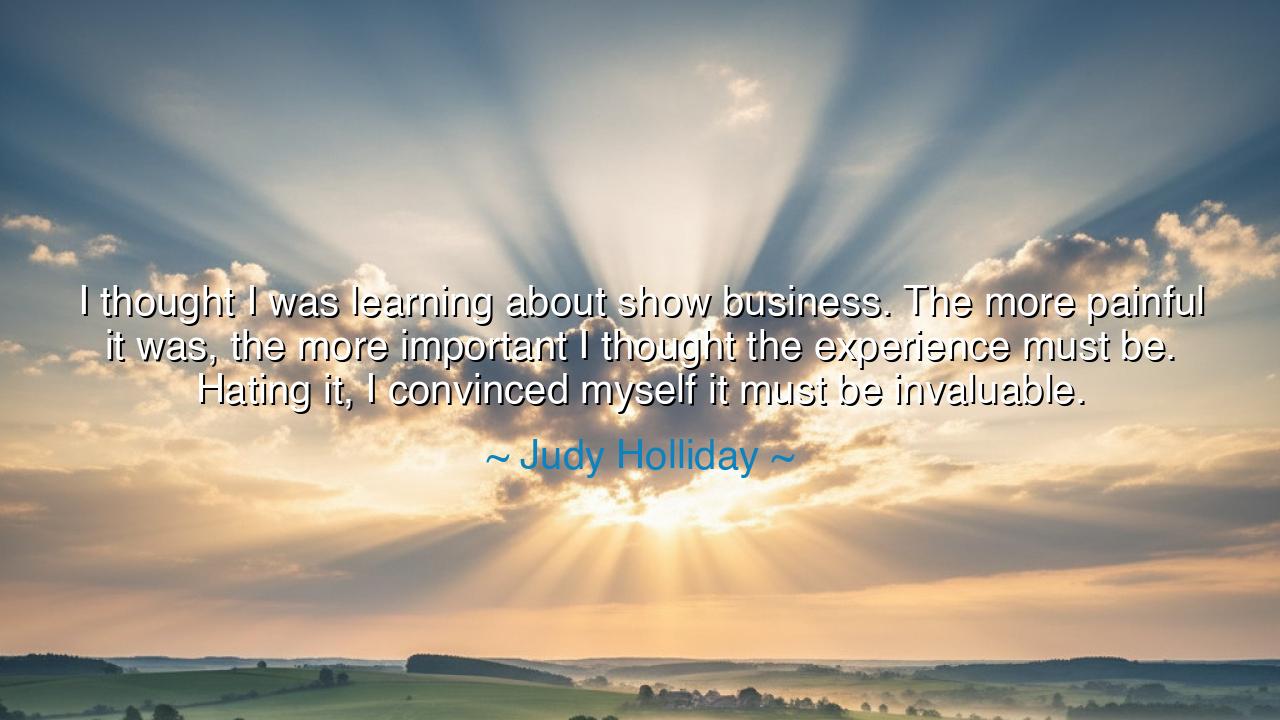
I thought I was learning about show business. The more painful it
I thought I was learning about show business. The more painful it was, the more important I thought the experience must be. Hating it, I convinced myself it must be invaluable.






Hear the words of Judy Holliday, who once confessed: “I thought I was learning about show business. The more painful it was, the more important I thought the experience must be. Hating it, I convinced myself it must be invaluable.” At first glance, these words appear as the lament of an artist battered by the hardships of her craft. Yet hidden within them lies a truth older than the theaters, older even than the songs of the ancients—that pain and struggle often disguise themselves as teachers, and that the soul, longing for meaning, may exalt suffering as a path to wisdom.
In speaking of show business, Holliday unveils not merely the glitter of the stage, but the shadows behind the curtains. She points to the trials that every seeker of greatness must endure: the rejection, the humiliation, the weight of expectations, and the loneliness of one who strives to please both the audience and her own heart. She believed that because her journey was bitter, it must also be essential. This belief reveals both the resilience and the vulnerability of the human spirit—our tendency to sanctify hardship, to find value even in the moments that wound us most deeply.
History offers us many such examples. Consider the tale of Vincent van Gogh, who lived in anguish and despair, often unrecognized, often ridiculed, yet who believed that his suffering must be the crucible of his art. Though he hated the torment of poverty and loneliness, he clung to the conviction that his pain carried some hidden value. Only after his death did the world discover the priceless gift that had been born from his struggle. His story mirrors Holliday’s words: the more bitter the path, the greater the treasure one hopes lies at its end.
Yet there is also a warning within Holliday’s confession. To hate the path, and yet to convince oneself it is invaluable, may bind the soul to cycles of unnecessary suffering. Not every hardship is noble, not every wound is holy. Sometimes we mistake abuse for discipline, cruelty for wisdom, and exploitation for opportunity. The ancients taught that discernment is the true companion of endurance: one must know which pains are the fire that purifies gold, and which are but the flames that consume it.
Still, her words reveal a courage that should not be dismissed. For to endure at all, even through hatred and doubt, requires strength. Many flee the path of difficulty; fewer walk it with clenched fists, believing that some truth waits beyond the struggle. Holliday reminds us that even when the heart rebels, endurance may carve lessons into the soul. But the wise must also know when to step away, when the lesson is not in further pain but in the courage to seek another road.
The lesson for us, then, is twofold: first, that pain often carries wisdom, but second, that not all pain is necessary. We must learn to sift the gold from the dross, to recognize which struggles shape us and which merely shackle us. Ask yourself: is this hardship teaching me strength, humility, or skill—or is it only draining the life from me? True growth is not in suffering for its own sake, but in discerning the meaning within it.
Practical action flows from this wisdom. When you face difficulty, do not flee at once, but lean into the trial long enough to ask what it has come to teach you. Yet also, do not linger in hatred forever. Seek mentors, seek friends, and seek balance; let your struggles refine you, but never let them define you. Remember that joy, too, is a teacher, and that the path of creation should hold not only pain but also moments of love, laughter, and light.
Thus, Judy Holliday’s words are both confession and counsel to future generations. They remind us that the human heart, desperate for meaning, often finds it in suffering. But the greater wisdom is this: suffering alone is not the measure of value—what matters is the lesson drawn, the growth attained, and the courage to choose wisely when to endure and when to walk away.






AAdministratorAdministrator
Welcome, honored guests. Please leave a comment, we will respond soon